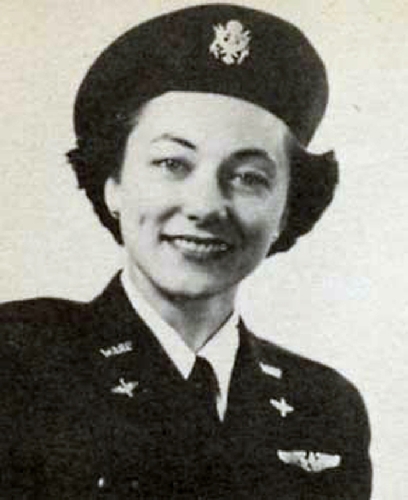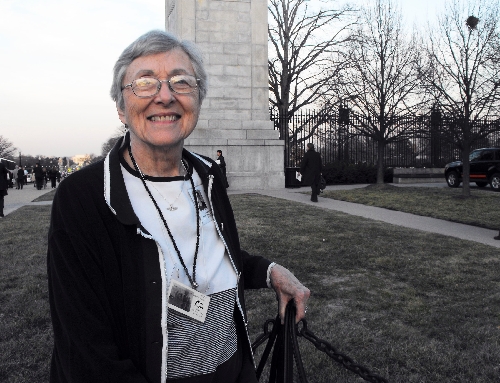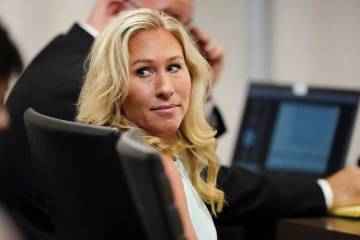‘Girl who liked to fly’ among pioneering aviators honored today in Washington
WASHINGTON -- As an adventurous teenager growing up in the wide open spaces of West Texas in the 1930s, Madge Ragan Leon Moore began taking flying lessons when she was 17.
After completing a bachelor's degree at Southern Methodist University in 1943, Moore looked for a field that would keep her interest.
She worked in her father's office, "and I wasn't really interested in that, and I fiddled around." Her aunt suggested she get into advertising or window dressing, "and I wasn't very interested in that."
But after reading a magazine article about pioneering woman aviator Jacqueline Cochran, she inquired about joining an experimental project that Cochran had helped form within the Army Air Corps.
It was Moore's first step in becoming a member of the Women Airforce Service Pilots, better known as WASP, a civilian corps of female fliers who served the manpower-strapped military during World War II.
Moore, now 88 and living with family in Las Vegas, is reconnecting with that part of her life this week in Washington. About half the 300 or so surviving WASPs are being feted by the Air Force, Congress and the foundation behind the Women in Military Service for America Memorial.
Today, the WASPs will be awarded the Congressional Gold Medal, the government's highest civilian award. The gold medal will be displayed at the Smithsonian Institution and each of the women will receive a bronze replica.
"I am flattered," Moore said. "I don't think of myself as a pioneer but maybe I am. I was a girl who liked to fly."
Some 25,000 women pilots applied to join the wartime corps, and 1,830 were accepted. Eventually 1,102 completed training at Avenger Field in Sweetwater, Texas, and were dispatched to 120 bases around the country.
With male pilots serving overseas, the women filled valuable roles ferrying planes from aircraft factories to military bases, relocating planes around the country where needed, testing repairs on damaged aircraft, flying training missions, and chauffeuring "ground-pounders," who were nonrated officers.
After the war, WASP records were classified and sealed for 35 years, and women had to fight to be recognized as World War II veterans. While largely a footnote in military history, the WASPs are regarded as trailblazers by succeeding generations of female pilots.
"These brave women broke barriers as they took to the sky and answered the call during our nation's time of need, and it is long past time that we recognize and thank them for their service," said Rep. Dina Titus, D-Nev.
A gold medal "is a fitting way for Americans to thank these individuals for their service to our nation," added Rep. Shelley Berkley, D-Nev.
In an oral history gathered in 1997 by Texas Woman's University, Moore said her father, Harry Server Leon, owned a theater in Haskell County, Texas, and paid $50 for 10 hours of flight lessons. He was not interested in flying; he just went up with a pilot and dropped advertising circulars over town.
Moore said she asked her father for the unused lessons, and that's how she got her start in the air. Her parents "encouraged me with whatever I wanted to do," she told the researcher.
On Tuesday, Moore said she joined the WASP because "it was a time when everybody wanted to do their part, and I loved flying and I knew that's what I wanted to do."
Moore graduated from WASP training on May 23, 1944, a proud moment with her father pinning on her Silver Wings. She then was stationed at Perrin Field in Sherman, Texas, where she flew AT-6s, a training aircraft.
The corps was deactivated in December of that year, as men began returning from Europe. But while in Sherman, Moore met her future husband, fellow pilot Stanley Moore. She largely stopped flying after they married and raised two sons. Stanley Moore passed away in 1992.
One of the destinations for WASP pilots was the Las Vegas Army Air Field, which later became Nellis Air Force Base.
One of the Las Vegas Army Air Field WASPs, Madelon Burcham Hill of Bend, Ore., now 91, will be getting a medal today .
"It will be interesting to see how she will react," said her son Thomas Hill of Las Vegas, a retired F-14 pilot who at one time commanded a squadron at Nellis.
Madelon Hill served at the Las Vegas airfield from 1942 to 1944. She flew B-17s, B-24s and B-25s on training runs over the desert, so that men seated behind her could get gunnery practice.
While stationed in Las Vegas, she met her future husband, Jack, who also was a pilot. Jack Hill will be in the audience today , along with their extended family of children and grandchildren.
Thomas Hill said recognition for his mother and other women pilots "was a long time coming."
He said his mother would shrug off the years of slight. For members of what has been called the Greatest Generation, "it was not about them, it was about the country."
"She knew what she did," Hill said. "It is just nice for other people to recognize it."
Contact Stephens Washington Bureau Chief Steve Tetreault at stetreault@stephensmedia.com or 202-783-1760.
Women Airforce Service Pilots, better known as WASP, a civilian corps of female fliers, served the military during World War II. More than 150 WASPs are being honored by the Air Force and Congress. Today, the group will be awarded the Congressional Gold Medal, the government's highest civilian award.


















